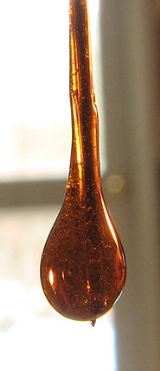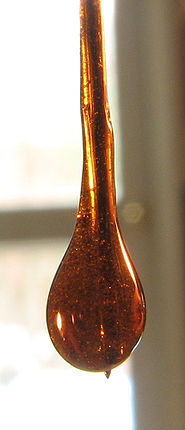
Hash oil
Encyclopedia

Resin
Resin in the most specific use of the term is a hydrocarbon secretion of many plants, particularly coniferous trees. Resins are valued for their chemical properties and associated uses, such as the production of varnishes, adhesives, and food glazing agents; as an important source of raw materials...
matrix of cannabinoids produced by a solvent extraction
Liquid-liquid extraction
Liquid–liquid extraction, also known as solvent extraction and partitioning, is a method to separate compounds based on their relative solubilities in two different immiscible liquids, usually water and an organic solvent. It is an extraction of a substance from one liquid phase into another liquid...
of cannabis
Cannabis
Cannabis is a genus of flowering plants that includes three putative species, Cannabis sativa, Cannabis indica, and Cannabis ruderalis. These three taxa are indigenous to Central Asia, and South Asia. Cannabis has long been used for fibre , for seed and seed oils, for medicinal purposes, and as a...
. Hash oil is a concentrated product with a high THC
Tetrahydrocannabinol
Tetrahydrocannabinol , also known as delta-9-tetrahydrocannabinol , Δ1-THC , or dronabinol, is the main chemical psychoactive substance found in the cannabis plant. It was first isolated in 1964. In pure form, it is a glassy solid when cold, and becomes viscous and sticky if warmed...
content, which generally varies between 70% and 90%. Related honey oil is a specific type of hash oil made from the more potent parts of the cannabis plant. Hash oil is traditionally a dark, viscous liquid.
Usage
Hash oil can be consumed in various ways, including smokingCannabis smoking
Cannabis smoking involves inhaling vapors released by heating the flowers and subtending leaves of the Cannabis plants, known as marijuana. Alternatively, the cannabis plant flowers may be finely sifted producing kief, a powder especially rich in the oil-glands or trichomes which contain the...
, vaporization
Vaporization
Vaporization of an element or compound is a phase transition from the liquid or solid phase to gas phase. There are three types of vaporization: evaporation, boiling and sublimation....
, or may be consumed orally.
Solvents
The most common solvents used are butaneButane
Butane is a gas with the formula C4H10 that is an alkane with four carbon atoms. The term may refer to any of two structural isomers, or to a mixture of them: in the IUPAC nomenclature, however, butane refers only to the unbranched n-butane isomer; the other one being called "methylpropane" or...
or isopropanol. Hash oil extracted with butane is often referred to as butane honey oil, or BHO.
There are a wide variety of dangers associated with use of chemical solvents. The most common danger is from flammability. Structure fires and severe burns have been caused when production accidents occur.

